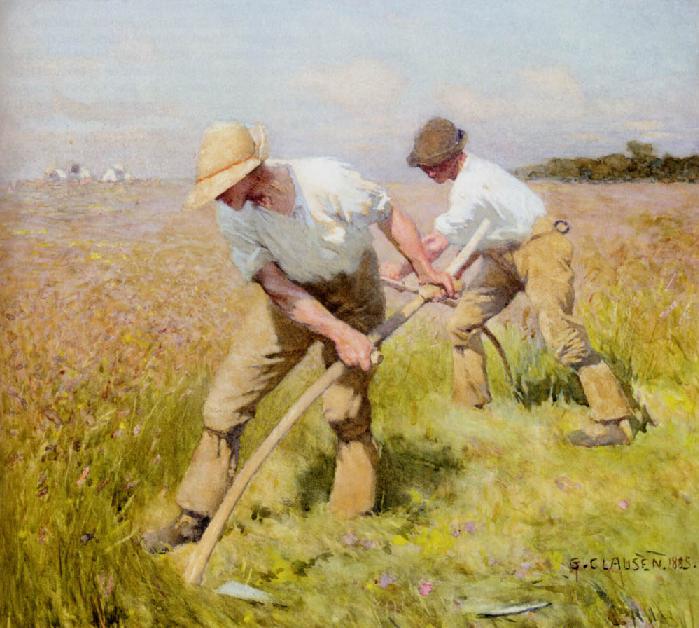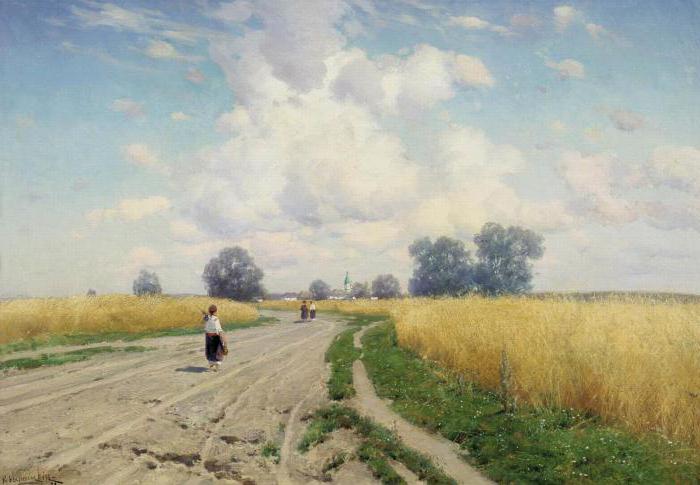Bunin Ivan Alekseevich in exile turns to the past, which he creates in a transformed form. About how great the thirst of this writer for his compatriots, how strong and deep his love for the motherland, testifies to the story under the title "Kosca". It refers to the peasants of the Ryazan land, their labor, singing during mowing, which takes for the soul. A very lyrical piece is Bunin's Kossa. We will provide a summary below.
What is the main charm of this story for the author?
Not only in the marvelous singing of men. It consisted in the fact that both the narrator and the peasants were the children of their homeland, and everyone was together, everyone was calm, good, although they did not understand these feelings clearly, since they should not be understood. This was another (unrecognized even then) charm: their homeland, their common home is Russia, and only her soul could sing exactly as the scythes did in the birch forest, responding to their every breath. We’ll tell you more about this when we describe the brief content of Bunin’s work “Kossa”.
What did Ivan Alekseevich write about in exile?
It should be especially noted that all of Bunin's creations related to the emigrant period were built (with rare exceptions) on Russian material. Ivan Alekseevich recalled his homeland in a foreign land, its villages and fields, nobles and peasants, nature. The writer knew the Russian nobleman and the peasant very well, he had a rich stock of memoirs and observations relating to Russia. He could not write about the West, which was alien to him, and he never found a second homeland in France. Bunin remained faithful to the traditions of Russian classical literature and continued them in his work, trying to solve questions of love, life, the future world.
Feeling doomed, thickening of time
He, as before, shifts death and life, horror and joy, despair and hope. But earlier, in his works, with such an exacerbation never felt a sense of doom and mortality of all things: power, fame, happiness, beauty - as in the creations of the emigrant period. Russia was inseparable from the writer, no matter how far he was. But it was a country that was pushed back, not the one that started earlier behind the window overlooking the garden; it was and at the same time as if it did not exist. In response to doubt and pain in the image of our country, the Russian that was supposed to go further from the past, which could not disappear, began to emerge more and more clearly. Sometimes in the power of a particularly grave sense of remoteness from his homeland, Bunin was visited by various illuminating thoughts, but the horizon remained hopeless.
The bright side of the work of the emigrant period

However, Bunin was far from always depressed. The summary (“Kosca”, 1921) proves that he, on the contrary, began to see more than, perhaps, earlier, when everything seemed to him obvious and not in need of approval. He now escaped the words that he previously held in himself, did not utter - they poured out transparently, freely, evenly. It is difficult to imagine anything more enlightened than the work of Bunin's “Scythes”. The summary does not convey all its features and moods, but even from it we can conclude that this story is a look from afar, with all its inherent features. The work in itself seems to be insignificant: in the birch forest there are mowers who came to the Oryol region from Ryazan land, sing and mow. But Bunin again managed to discern in a single moment the distant and immeasurable, connected with the whole of Russia. A small space was filled and a bright lake turned out , not a story. And a great city was reflected in this lake.
The idea of the difficult, tragic fate of our country permeated all the work of Bunin of the emigrant period.
Summary of the work "Kossa"
The narrator recalls how he walked along the road, and not far from it in a young birch forest, the piglets sang and mowed. These events happened a long time ago. The life that everyone lived at that time will never come back.
"Fields spread around," writes Bunin. Summary ("Kosca") opens with a description of nature. A large old road, rugged by ruts, led to an endless distance. The sun was gradually leaning west, a flock of sheep grayed in front. At the boundary sat an old shepherd with a backup. It seemed that time did not exist in this forgotten (perhaps blessed) country. And the piglets walked and walked, and at the same time sang in the silence. The birch forest answered them just as easily and easily, which is noted in the work of Kossa by Bunin. We continue the summary with a description of the peasants.
Pigs
They were Ryazan, non-native, passed through these lands, advancing to more fertile places. Friendly and carefree, not burdened with anything, they loved the job. Their clothes were better than the locals. This way you can describe the peasants, briefly covering the story of I. A. Bunin, "Kossa".
The author rode a week ago and watched as they mowed in the nearby forest. Sweetly drunk from the jugs of pure spring water, the men cheerfully ran to the workplace. And then the narrator watched as they had dinner: they sat around an extinct fire, took out pieces of something pink from cast iron. Looking closely, he realized with horror that these people ate mushroom mushrooms. And they only chuckled: "They are sweet, like chicken."
Song of the Mowers
The Pigmen hummed now: "Forgive me, goodbye, dear friend!" They walked slowly through the forest. And the narrator, along with his companion, listened to them, standing still, realizing that he would never forget this evening before night. He realized that it was impossible to understand what the charm of this song was. It is precisely about her that Bunin I.A. further discusses. The summary (“The Scythes”) will not convey the entire dramaturgy of the work, but we note that the charm was in everything: the sound of the birch forest, and the fact that this song did not exist separately, itself by itself, but was inextricably linked with the feelings and thoughts of the narrator and his companion, as well as with the feelings and thoughts of the Ryazan pigs themselves. It was felt in her that a person does not know about his talents and strengths and is so naive in this ignorance that one just has to breathe a little while the forest immediately responds to this song.
What else was her charm, in spite of all hopelessness? It consisted in the fact that a person did not believe in this hopelessness. He spoke, mourning himself, that all paths had been ordered to him. But those who do not really have a road-road anywhere do not cry or express their sorrow in a song. It sang in her that happiness had set in, the night with its dark wilderness surrounds on all sides. And how bloodly close a man was with this wilderness alive for him, with its magical powers and virginity. Everywhere there was a lodging for him, a shelter, the intercession of someone whispering someone's voice: "The morning of the evening is wiser, don’t get tired, sleep peacefully, nothing is impossible." Man from all troubles was rescued by animals and birds of the forest, wise, beautiful princesses and even Baba Yaga. For him, there were invisible hats, carpet carpets, precious treasures lurked, milk rivers flowed, and from the spell of death there were keys with living water. The merciful God forgave all sharp whistles for hot, sharp knives.
There was one more thing in this song - something that both listeners and these Ryazan men knew well at heart. In those days they were infinitely happy, and now this time is already irreversible, infinitely far.
The fairy tale has passed, since everything has its own term. God's forgiveness has come to an end. Thus ends his work Bunin Ivan Alekseevich ("Kosca"). Brief contents, of course, are not able to convey all the charm of a literary text. This is especially true for works depicting thoughts and feelings. You can fully penetrate them only by reading the full content. "Kosca" (I. Bunin) is a work of small volume, so you can always turn to it - it will not take much time.
The idealized image of the motherland
In a work written in 1921, an idealized image of the homeland appears, which was once, and which will never be again. We hope that you were able to understand this by reading the summary of the story by I. A. Bunin, “Kossa”. The author reflects in this work a great love for Russia. At the beginning of the story, he portrays a picture of Russian nature, surprisingly poetic. These are fields, the wilderness of primordial, central Russia. The early hours of one of the June days. The big old road, which is overgrown with ant, is cut up by ruts, traces of the life of grandfathers and fathers, goes far ...

In this description, the reader finds all the attributes of Russia of the pre-revolutionary years. The road is one of the favorite symbols of our Motherland, a reminder of the connection of generations, of ancestors, it is also associated with the loss of ideas about the existence of time. Then we are presented with a description of the Kossians who sing a song, where the blood relationship with their native land was reflected. She is admired by the audience.
The bitterness of loss
All this could cause only the best feelings among the readers of the work if it were not for the phrase preceding the story that it was infinitely long, since the life that they lived at that time would never return. Bunin's “Kosca”, a brief summary of which was presented to you, reflects the complex feelings that possessed the soul of the writer in exile. A break in ties with the homeland is always experienced hard. It is doubly difficult if you realize that it cannot be returned in any way - the former country no longer exists. A retelling of Bunin’s work “The Scythe” reflects this.